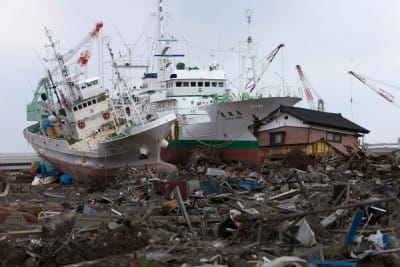Japan to widen nuke evacuation zone

Ships and houses sitting on a rice field amid tsunami rubble in the Ohmagari district of Higashimatsushima in Miyagi prefecture. Nearly four weeks after a massive tsunami slammed into northeastern Japan, the devastation it left in its wake has barely been touched as radiation and legal issues hampered the clean-up.Photo: AFP
Japan said yesterday it is considering expanding the area covered by a compulsory evacuation order, with no immediate end in sight to the world's worst nuclear accident since Chernobyl.
As emergency workers began pumping nitrogen into the quake-damaged Fukushima Daiichi plant to prevent further explosions, the government said it was seeking advice from experts on whether more areas should be evacuated.
Meanwhile, Japan's neighbours sounded increasingly alarmed over the risk of radiation from the crippled Fukushima nuclear power plant, while despite being the tourist season, the number of foreign visitors had slumped.
Residents within a 20-kilometre radius of the nuclear power plant have already been ordered to leave, while those living up to 10 km beyond that have only been told to stay indoors.
Evacuation orders are currently issued when residents are at risk of receiving radiation of at least 50 millisieverts, but the government said that arrangement assumed only brief exposure.
Edano said a procedure to inject nitrogen gas, designed to reduce the risk of a hydrogen explosion, was "proceeding smoothly."
Radiation from the plant has leaked into the sea and air, contaminating vegetables and raising fears over marine life in a country where the national diet depends heavily on seafood.
China's health ministry said traces of radioactivity in spinach had been found in three provinces.
India earlier this week banned Japanese food imports for three months.
In South Korea, some schools closed because parents were worried that rain across the country could be toxic.
"We've sent out an official communication today that schools should try to refrain from outdoor activities," an education official in South Korea said.
South Korea's nuclear safety agency reported a small level of radioactive iodine and caesium particles in rain in the south but said it was not enough to be a public health concern.

 For all latest news, follow The Daily Star's Google News channel.
For all latest news, follow The Daily Star's Google News channel. 




Comments